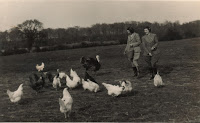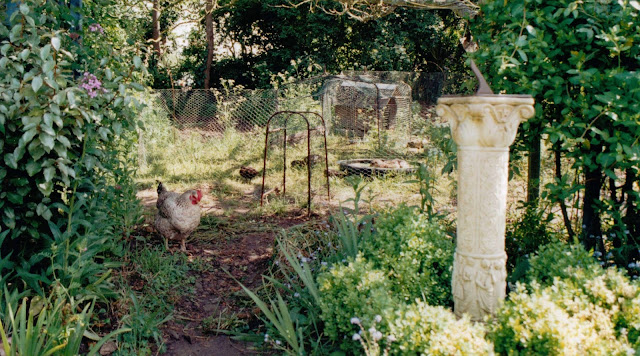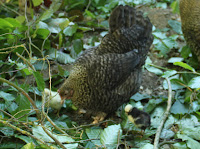This is the second part of my introduction of how we use 'greenfood', forage aka free organic food for our poultry. If you have just arrived on this topic and want to go back to the beginning then Part One can be found here. Below is our hen Dorothy a year on from her arrival, older, larger and wiser. In the background you can see our neighbours' ducklings, we had moved them over for a holiday, as they were having 'pecking order' issues at home.
Big Dorothy - A Cautionary Tale
This
is a proviso I'm adding to my thoughts on forage, sharing my experience
of having observed the behaviour of a bird seeing unlimited free forage
for the first time in her life!
The
third hen we added to our flock some years ago was a Wyandotte cross, we called her Dorothy. She was part payment for looking after our neighbours' homestead aka smallholding whilst they were away on holiday. Dorothy came to us from living on essentially a beaten earth pad with a few tufts of grass, a regular supply of table-scraps and an occasional large specimen of Sow thistle, thrown over when my neighbour used to hand-weed his garden. At the time of Dorothy's arrival our garden was in transition from an open and very weedy field, thus including many large specimens of sonchus oleraceus or Sow thistle. This plant has amongst its other names, Hare's lettuce, as both rabbits and hare are said to be inordinately fond of it. Well coming into a garden chock full of green-stuff, this was I guess, the first thing that Dorothy recognised and like a kid in a candy store, she ate a great deal of it and with interesting results. Sonchus oleraceus is both a medicinal and wild edible, one of its virtues is as a purge for the digestive and urinary system, being both a diuretic and a laxative. Thinking back on this now I am actually wondering whether Dorothy didn't in fact know of this property (having eaten it on a regular basis in the past) and was using it as such to cleanse her system before moving on to a new life? I wouldn't have put it past her. The moral of this story however, is that if you are rehoming ex-battery hens or moving a flock into pasture for
the first time, or perhaps more importantly offering them a particular weed, which has medicinal properties then you would be advised to go easy on the volumes.
The first thing I would recommend is a couple of good books, one to identify the plant, either by photographs or quality botanical drawings and an old fashioned herbal or a modern wild edible book. I think actually there is now an app, which identifies plants as you zoom in on them with a phone! We are what we eat but we are also what everything we eat eats and this goes for plants as well. Plants are used all over the World in phytoremediation projects, to clear up the chemical and biological messes man has left and still leaves, behind him. Everything from nuclear dumping and disasters, to old mining spoil and industrial waste can be removed with precise plantings. Many forage plants, including chickweed, have the ability to absorb and even feed off toxins. Always be aware, not only of where you are harvesting your forage but that the very abundance of any single plant in one area can be a tell tale sign of the quality or state of the soil. Here for example above, is a beautiful alkaline meadow, created by my father to illustrate soil types
Furthermore certain plants
although actually botanically the same, have the ability to subtly alter their chemical constituents, due to climate, water, light levels and soil The whole reason why quality Essential Oils, for example, are chemotyped is because the exact same plant, such as thyme, Thymus vulgaris can furnish eight separate and unique oils, which may be used therapeutically for completely different conditions and in completely different ways dependant on location and climate.
The other variable on plants is stress, this can cause changes in the chemical make-up of a plant and in, for example drought stress, high levels of nitrate. Stress to a plant can also cause it to increase its potential to produce anti-nutrients or insecticides, with which to protect it in its weakened state from predators. However nitrates are mostly of danger to ruminants and hens can certainly detect the bitter taste of certain toxins and anti-nutrients but it is better to be safe and not pick in times of drought.
In the normal way a hen would forage in a forest, an open meadow or hedgerow, she would be able to pick and choose very freely and easily from a whole myriad of forage. If like me you are having to bring forage in then the key to this is variety. As the 15th century botanist and philosopher Paracelsus, often referred to as the father of toxicology described it:
 'Everything is poison and nothing is without poison, only the dose makes a thing non-toxic.'
'Everything is poison and nothing is without poison, only the dose makes a thing non-toxic.'
As an illustration of this, a paper I read recently, experiments to the trialling of dried chickweed as a leaf meal for farmed Tilapia was found to be not as successful as hoped because of an increased level of oxalic acid in the plant material. This is why I believe forage needs to be as varied as possible and why I am so lucky to have the mowings from a meadow rather than a lawn. I also plan each year to have all kinds of additional and forest garden forage which allows my birds to pick and chose what and when to eat. This is particularly important for me in the Winter, when neighbourhood forage is rarer and grass, when available less nutritious but there are still a lot of choices out there and many people are only too glad that you are saving them a trip to the dump. Witness the above photo taken this morning of my birds enjoying the bounty of a friend's sweepings from a wild garden.
In an ideal world we would all have enough land to allow our poultry a vast tract of old meadow or woodland in which to forage, free from NPK fertilisers and potential toxins, both self-induced and man-made, however, with common sense and a good wildflower/wild plant identification book and herbalist's vade mecum, we can make forage work well for us and our flock. Over the past few months I have been researching and also collecting photographs and films of my birds consuming various home-raised/grown and neighbourhood sourced forage, which I will be sharing in the coming weeks.
If you have enjoyed this blog and found it interesting then please think about subscribing, sharing it and/or commenting. Please also feel free to ask questions.
All the very best,
Bringing in forage - What, Where from and When
The first thing I would recommend is a couple of good books, one to identify the plant, either by photographs or quality botanical drawings and an old fashioned herbal or a modern wild edible book. I think actually there is now an app, which identifies plants as you zoom in on them with a phone! We are what we eat but we are also what everything we eat eats and this goes for plants as well. Plants are used all over the World in phytoremediation projects, to clear up the chemical and biological messes man has left and still leaves, behind him. Everything from nuclear dumping and disasters, to old mining spoil and industrial waste can be removed with precise plantings. Many forage plants, including chickweed, have the ability to absorb and even feed off toxins. Always be aware, not only of where you are harvesting your forage but that the very abundance of any single plant in one area can be a tell tale sign of the quality or state of the soil. Here for example above, is a beautiful alkaline meadow, created by my father to illustrate soil types
The other variable on plants is stress, this can cause changes in the chemical make-up of a plant and in, for example drought stress, high levels of nitrate. Stress to a plant can also cause it to increase its potential to produce anti-nutrients or insecticides, with which to protect it in its weakened state from predators. However nitrates are mostly of danger to ruminants and hens can certainly detect the bitter taste of certain toxins and anti-nutrients but it is better to be safe and not pick in times of drought.
Too Much of a Good Thing?
In the normal way a hen would forage in a forest, an open meadow or hedgerow, she would be able to pick and choose very freely and easily from a whole myriad of forage. If like me you are having to bring forage in then the key to this is variety. As the 15th century botanist and philosopher Paracelsus, often referred to as the father of toxicology described it:
 'Everything is poison and nothing is without poison, only the dose makes a thing non-toxic.'
'Everything is poison and nothing is without poison, only the dose makes a thing non-toxic.'As an illustration of this, a paper I read recently, experiments to the trialling of dried chickweed as a leaf meal for farmed Tilapia was found to be not as successful as hoped because of an increased level of oxalic acid in the plant material. This is why I believe forage needs to be as varied as possible and why I am so lucky to have the mowings from a meadow rather than a lawn. I also plan each year to have all kinds of additional and forest garden forage which allows my birds to pick and chose what and when to eat. This is particularly important for me in the Winter, when neighbourhood forage is rarer and grass, when available less nutritious but there are still a lot of choices out there and many people are only too glad that you are saving them a trip to the dump. Witness the above photo taken this morning of my birds enjoying the bounty of a friend's sweepings from a wild garden.
In Conclusion
In an ideal world we would all have enough land to allow our poultry a vast tract of old meadow or woodland in which to forage, free from NPK fertilisers and potential toxins, both self-induced and man-made, however, with common sense and a good wildflower/wild plant identification book and herbalist's vade mecum, we can make forage work well for us and our flock. Over the past few months I have been researching and also collecting photographs and films of my birds consuming various home-raised/grown and neighbourhood sourced forage, which I will be sharing in the coming weeks.
If you have enjoyed this blog and found it interesting then please think about subscribing, sharing it and/or commenting. Please also feel free to ask questions.
All the very best,
Sue
RELATED POSTS
 Providing Forage for Organic Poultry Part 1
Providing Forage for Organic Poultry Part 1
Learning from the past. If you are setting up a forest garden to run your poultry
through it, you are probably going to be short of certain wild pasture elements...read more
 Food for Free. Fabulous Forage Part 1 Grass
Food for Free. Fabulous Forage Part 1 Grass
For centuries farmers and homesteaders raised poultry on a forage-based
diet supplemented only by a handful of grain and the occasional table
scraps..read more

RETURN TO CONTENTS PAGE
© Sue Cross 2016
Food for Free. Fabulous Forage Part 2 Chickweed
Stellaria media an incredible food and medicinal for poultry, an in-depth look at this ubiquitous weed..read more
Food for Free. Fabulous Forage Part 3 Tree Fodder & Tree Hay
The idea of tree fodder is inextricably linked with the changing landscape, the full domestication of animals, the concept of farming and the clearance of the forests... read more
Food for Free. Fabulous Forage Part 4 Roses for Food & Forest
For me the rose is the quintessential forest garden plant, from canopy to ground cover there are so many to choose from ... read moreFood for Free. Fabulous Forage Part 5 Rose Petals
One of the main roses I use for both cooking, medicinals and which my hens very much enjoy is, not surprisingly, rosa gallica Officinalis, or The Apothecary Rose... read more© Sue Cross 2016









